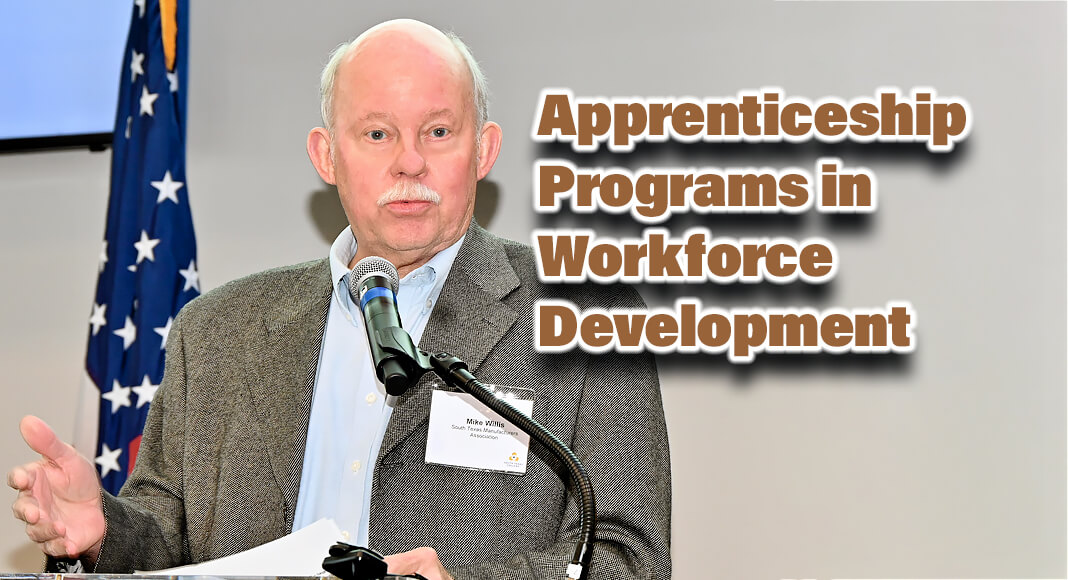
Texas Border Business
By Roberto Hugo González
On November 16, 2023, South Texas College (STC) hosted its annual Apprenticeship Summit, a key event that brought together workforce leaders and professionals to discuss the impact of STC on the region’s workforce. This summit aimed to engage the community, seeking input on workforce needs and exploring the benefits of apprenticeships in various industries.
The summit underscored STC’s leadership in creating registered apprenticeships, including the first Registered Nursing Apprenticeship in the nation. These programs embody an earn-while-you-learn model, offering participants on-the-job training coupled with skill acquisition and industry certification.
Mike Willis, with over two decades of collaboration with STC, shared valuable insights on the evolution and significance of apprenticeships. He reflected on his career transition from manufacturing manager to his current role at the South Texas Manufacturers Association (STMA). Willis emphasized the long-standing effectiveness of apprenticeships, noting their critical role in industries like construction and manufacturing.
He highlighted the collaborative efforts from 2002 to 2010 between STMA, STC, and other institutions to develop manufacturing apprenticeship programs. These efforts, supported by a Department of Labor grant, focused on specialized roles like industrial mechanics, tool and die makers, and plastic process technicians, with an emphasis on creating regional standards.
The summit provided a platform for discussing challenges in standardizing apprenticeship programs across diverse manufacturing sectors. Willis pointed out the need for consistent national standards and the difficulties in coordinating training due to factors like industry structure, turnover rates, and shift work.
A key takeaway from Willis’s speech was the necessity for structured on-the-job training within apprenticeship programs. He stressed that businesses must not only accommodate but also actively support these programs to ensure their effectiveness.
The summit highlighted the advantages of apprenticeships in providing career pathways and skill development. Willis urged businesses to consider the long-term benefits of these programs, which contribute to a highly skilled and adaptable workforce.
The recent STC Apprenticeship Summit served as a crucial platform for sharing experiences, discussing challenges, and reinforcing the value of apprenticeship programs in building skilled and adaptable workforces.
The STC Apprenticeship Summit, with the insightful participation of Willis, marks a significant step in addressing current workforce challenges and future needs. Willis’s extensive experience and deep understanding of apprenticeship programs have been instrumental in shaping the dialogue around workforce development.
He reiterated that apprenticeships are a time-tested model, especially vital in industries where technical skills and hands-on experience are paramount. He pointed out their necessity in fields where licensure is contingent upon completing an apprenticeship, such as in electrical and plumbing trades.
Discussing the changes over the years, Willis shed light on how globalization and industry dynamics have affected apprenticeship programs, especially in manufacturing. He noted the challenges posed by outsourcing and the shift to smaller, specialized firms, which have impacted the structure and feasibility of apprenticeships.
He also emphasized the importance of regional collaboration, as seen in the partnership between STMA and STC. This collaborative approach allowed for the development of standards and programs that met regional needs, benefiting both students and employers.
A critical point in Willis’s speech was the need for industry-led standards to ensure that apprenticeship programs are relevant and consistent. This approach helps in standardizing skills and knowledge, making them transferable across different job roles and regions.
Looking ahead, Willis advocated for the continuous evolution of apprenticeship programs to keep pace with technological advancements and changing industry needs. He highlighted the importance of flexibility in these programs to accommodate diverse learning styles and career paths.
In his closing remarks, Willis called for a collective effort from educational institutions, industries, and policy makers to support and expand apprenticeship programs. He stressed that such collaboration is essential for developing a skilled and adaptable workforce, capable of meeting the demands of a rapidly changing global economy.












